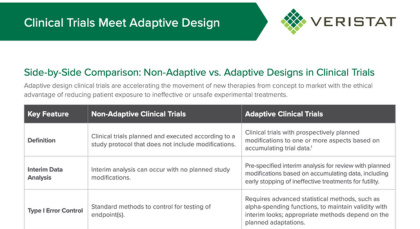Therapeutic Areas
Endocrine and Metabolic Disease
Overcoming complexities to advance your endocrine and metabolic disease treatments to market rapidly
Metabolic and endocrine diseases are a rising therapy area focus for clinical research due to the high demand for novel therapies that are challenged with proving safety and efficacy. At Veristat, we have assembled an extraordinary team of scientific-minded experts who have mastered the complexities of running metabolic disease trials. In the past five years, our team has supported 200+ projects for endocrine/metabolic disorder treatments and prepared nearly 40 marketing applications.
Developing endocrine or metabolic therapy?
Endocrine and Metabolic Disease Experience in the Past 5 Years
+0
clinical trials & consulting project supported
0%
in Rare/Ultra-Rare Indications
~0
Marketing Applications Prepared
Let's Talk.
Contact Veristat Today!
We know there are always unknown challenges when bringing a novel therapeutics to market, so we’ve assembled an extraordinary team of scientific minded experts who have mastered the complexities of therapeutic development enabling sponsors to succeed in extending and saving lives.
Experience in Taking on Endocrine and Metabolic Disease Clinical Trials
Whether you are aiming to combat a thyroid, inherited, or reproductive disorder, Veristat can help make a difference in your study’s success. Our teams understand the nuances and difficulties involved with treating endocrine and metabolic diseases, including experience executing type 1 and 2 diabetes trials.
Veristat’s experts are poised to plan and launch your trials quickly providing:
-
Rapidly advance your clinical trial to its next milestone.
-
Reliably achieve regulatory success with regulatory consulting advice, marketing application support, and regulatory publishing.
-
Gain trusted strategic advice from scientific experts across all disciplines along the clinical development and commercialization pathway.
-
Ensure ongoing safety for marked products with Post-Market Pharmacovigilance.
Case Study: Flexibility Drives Progress During a Rare Disease Gene Therapy Clinical Trial
Veristat was engaged by a biotech organization focusing on gene therapies for metabolic diseases to support their clinical study for the treatment of a rare human genetic lysosomal storage disorder. Through a collaborative partnership and a flexible operating model, we addressed critical patient, lab, product manufacturing, logistics, and tracking/reporting requirements to satisfy our Sponsor’s requirements at every milestone.
Scientific Excellence Across Endocrine & Metabolic Disease Indications
Common Indications
- Diabetes (Type 1 and 2)
Menopause - NASH
Obesity
Polycystic Ovary Syndrome
and more...

Rare Indications
- Adrenoleukodystrophy
Bardet-Biedl Syndrome
Fabry Disease
Gaucher Disease
Lysosomal Acid Lipase Deficiency
Pompe Disease
and many more...

Pediatric Indications
- Cerebral Adrenoleukodystrophy
- Duchenne Muscular Dystrophy
Limb-girdle Muscular Dystrophy
Myotonic Dystrophy
X-linked Myotubular Myopathy
and more...

I would like to thank the entire team at Veristat, who worked day and night to submit our DSUR and our IND within thirty days of starting to work with us!
In addition to managing the process, the team worked seamlessly with us in the United States and our partner in Korea. Your team advised and guided us to produce quality submissions to meet our challenging corporate goal of submitting both on time. Due to these extraordinary efforts, we plan to work with you on our second IND submission.










